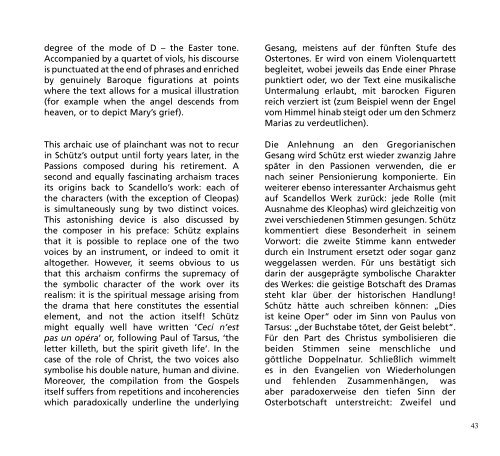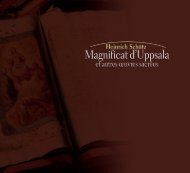Histoire de la Résurrection & Musikalische Exequien - La Chapelle ...
Histoire de la Résurrection & Musikalische Exequien - La Chapelle ...
Histoire de la Résurrection & Musikalische Exequien - La Chapelle ...
Create successful ePaper yourself
Turn your PDF publications into a flip-book with our unique Google optimized e-Paper software.
<strong>de</strong>gree of the mo<strong>de</strong> of D – the Easter tone.<br />
Accompanied by a quartet of viols, his discourse<br />
is punctuated at the end of phrases and enriched<br />
by genuinely Baroque figurations at points<br />
where the text allows for a musical illustration<br />
(for example when the angel <strong>de</strong>scends from<br />
heaven, or to <strong>de</strong>pict Mary’s grief).<br />
This archaic use of p<strong>la</strong>inchant was not to recur<br />
in Schütz’s output until forty years <strong>la</strong>ter, in the<br />
Passions composed during his retirement. A<br />
second and equally fascinating archaism traces<br />
its origins back to Scan<strong>de</strong>llo’s work: each of<br />
the characters (with the exception of Cleopas)<br />
is simultaneously sung by two distinct voices.<br />
This astonishing <strong>de</strong>vice is also discussed by<br />
the composer in his preface: Schütz exp<strong>la</strong>ins<br />
that it is possible to rep<strong>la</strong>ce one of the two<br />
voices by an instrument, or in<strong>de</strong>ed to omit it<br />
altogether. However, it seems obvious to us<br />
that this archaism confirms the supremacy of<br />
the symbolic character of the work over its<br />
realism: it is the spiritual message arising from<br />
the drama that here constitutes the essential<br />
element, and not the action itself! Schütz<br />
might equally well have written ‘Ceci n’est<br />
pas un opéra’ or, following Paul of Tarsus, ‘the<br />
letter killeth, but the spirit giveth life’. In the<br />
case of the role of Christ, the two voices also<br />
symbolise his double nature, human and divine.<br />
Moreover, the compi<strong>la</strong>tion from the Gospels<br />
itself suffers from repetitions and incoherencies<br />
which paradoxically un<strong>de</strong>rline the un<strong>de</strong>rlying<br />
Gesang, meistens auf <strong>de</strong>r fünften Stufe <strong>de</strong>s<br />
Ostertones. Er wird von einem Violenquartett<br />
begleitet, wobei jeweils das En<strong>de</strong> einer Phrase<br />
punktiert o<strong>de</strong>r, wo <strong>de</strong>r Text eine musikalische<br />
Untermalung er<strong>la</strong>ubt, mit barocken Figuren<br />
reich verziert ist (zum Beispiel wenn <strong>de</strong>r Engel<br />
vom Himmel hinab steigt o<strong>de</strong>r um <strong>de</strong>n Schmerz<br />
Marias zu ver<strong>de</strong>utlichen).<br />
Die Anlehnung an <strong>de</strong>n Gregorianischen<br />
Gesang wird Schütz erst wie<strong>de</strong>r zwanzig Jahre<br />
später in <strong>de</strong>n Passionen verwen<strong>de</strong>n, die er<br />
nach seiner Pensionierung komponierte. Ein<br />
weiterer ebenso interessanter Archaismus geht<br />
auf Scan<strong>de</strong>llos Werk zurück: je<strong>de</strong> Rolle (mit<br />
Ausnahme <strong>de</strong>s Kleophas) wird gleichzeitig von<br />
zwei verschie<strong>de</strong>nen Stimmen gesungen. Schütz<br />
kommentiert diese Beson<strong>de</strong>rheit in seinem<br />
Vorwort: die zweite Stimme kann entwe<strong>de</strong>r<br />
durch ein Instrument ersetzt o<strong>de</strong>r sogar ganz<br />
wegge<strong>la</strong>ssen wer<strong>de</strong>n. Für uns bestätigt sich<br />
darin <strong>de</strong>r ausgeprägte symbolische Charakter<br />
<strong>de</strong>s Werkes: die geistige Botschaft <strong>de</strong>s Dramas<br />
steht k<strong>la</strong>r über <strong>de</strong>r historischen Handlung!<br />
Schütz hätte auch schreiben können: „Dies<br />
ist keine Oper“ o<strong>de</strong>r im Sinn von Paulus von<br />
Tarsus: „<strong>de</strong>r Buchstabe tötet, <strong>de</strong>r Geist belebt“.<br />
Für <strong>de</strong>n Part <strong>de</strong>s Christus symbolisieren die<br />
bei<strong>de</strong>n Stimmen seine menschliche und<br />
göttliche Doppelnatur. Schließlich wimmelt<br />
es in <strong>de</strong>n Evangelien von Wie<strong>de</strong>rholungen<br />
und fehlen<strong>de</strong>n Zusammenhängen, was<br />
aber paradoxerweise <strong>de</strong>n tiefen Sinn <strong>de</strong>r<br />
Osterbotschaft unterstreicht: Zweifel und<br />
43



